|
|
|
Sort Order |
|
|
|
Items / Page
|
|
|
|
|
|
|
| Srl | Item |
| 1 |
ID:
175168


|
|
|
|
|
| Summary/Abstract |
This article probes the promises and anomalies of a new universalism proposed by Dipesh Chakrabarty as an apparent retort to the challenge of the Anthropocene. Revising established understandings of temporality and human agency imagined within modernity, the new universalism depicts a radically different horizon shaped by interconnections produced by the subsumption of human history into natural history. A key element of Chakrabarty’s new universalism is his dramatic repudiation of the reputed postcolonial claim of difference which hurriedly dissolves the afterlife and persistence of coloniality on a global scale in favour of a yet-to-be-forged planetary consciousness. Chakrabarty’s new universalism raises profound questions for rethinking International Relations (IR). However, without due cognisance of sedimented difference, Chakrabarty ends up reciting the secular-liberal story of one-world universalism. It is argued here that a differentiated universalism organised around the notion of human finitude can simultaneously attend to postcolonial concerns and the challenge of the Anthropocene.
|
|
|
|
|
|
|
|
|
|
|
|
|
|
|
|
| 2 |
ID:
175172
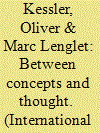

|
|
|
|
|
| Summary/Abstract |
This article advances the argument that the acceleration of practices introduced by digital technologies also impact key concepts of social theory. Digital technologies not only give rise to new concepts, but they also reconfigure our entire socio-political conceptual vocabulary. In particular, this acceleration reorganises the relationship between the spatial and temporal dimensions of political concepts. As a consequence, our spatially defined understanding of authority, hierarchy or relation underestimates the repercussions of shifting temporalities. This article pursues this shift from space to time and outlines how temporal relationality is gradually impacting the representations and images we live by.
|
|
|
|
|
|
|
|
|
|
|
|
|
|
|
|
| 3 |
ID:
175169


|
|
|
|
|
| Summary/Abstract |
This article considers what is necessary politically to respond to the empirical challenge of climate change and to the present calls of climate science (a carbon-neutral world by 2050). Its basic argument is that, among an array of national and international actors, it remains the state that can drive a successful politics of climate change. Without the heavy-lifting of the state and the state’s ability as a national entity to motivate behavioural change, neither the daunting scale nor imminent time-horizon of climate mitigation and adaptation is possible. The article shows how this specific argument, far from pitching anew nationalism against internationalism, can bring the two presently polarized movements together. The article then suggests that if these arguments are essentially valid, the discipline of International Relations needs to focus much more on the climate challenge, re-engage with its traditions of thought on the state and help harbour a specific disposition or mindset in the research and teaching of the discipline for the next decades: a fierce optimism.
|
|
|
|
|
|
|
|
|
|
|
|
|
|
|
|
| 4 |
ID:
175164
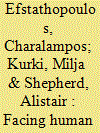

|
|
|
|
|
| Summary/Abstract |
Communities on the planet are faced with complex challenges: changing relations within and between human communities, changing relations with ecological and climatic conditions, and shifts in technology-human interconnections. The complex interconnections across issue areas – migration, environmental degradation and new technologies, for example – demand that scholars increasingly think across theories, paradigms, specialisms and disciplines. But how should we ‘hold things together’ as we try to make sense of complex realities in International Relations (IR)? This introductory article to the Special Issue ‘Facing human interconnections: thinking International Relations into the future’ discusses the open thematic of ‘human interconnections’ that is used to loosely structure the contributions. Analysis of human interconnections, as understood here, does not have a precise or fixed definition but is considered an open-ended notion with varied meanings and dimensions. Indeed, the authors engage it here in varied ways to explore their empirical, theoretical and political concerns. Yet, this notion also allows for interesting new questions to be posed on the potential and limits of IR as it faces the future, and debates around how we see interconnections between issue areas and ‘-isms’, how IR constructs ‘humans’ or ‘non-humans’ in interconnections, and what is at stake in bringing to our attention unacknowledged interconnections. Here we set out why human interconnection is an interesting notion to work with and why we need to keep its meaning open-ended. We also provide an account of six different orientations we observe amongst the authors tackling the dynamics of human interconnections in this Special Issue.
|
|
|
|
|
|
|
|
|
|
|
|
|
|
|
|
| 5 |
ID:
175173
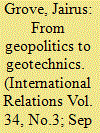

|
|
|
|
|
| Summary/Abstract |
This exploration provides an alternative future to that offered in the discussions surrounding what is often referred to by the ‘fourth industrial revolution’ or the ‘third offset’. I argue that even modest projections of existing trends have the capability of altering the grammar or ecology of geopolitics as well as the drivers for competition and catastrophe. Such changes are more significant than questions of how this or that actor might be different or which great powers may shape the international order in a hundred years. The essay seeks to understand what disruptive changes in non-human capability might mean for the shape of a potential geopolitics to come. In a more general sense, I want to think about how violence will be distributed differently. Will there be new sources and even kinds of competition unique to a global system populated and in some cases, structured by cunning machines – some mechanical, others digital – and what are the implications for how we imagine international relations?
|
|
|
|
|
|
|
|
|
|
|
|
|
|
|
|
| 6 |
ID:
175171
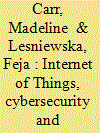

|
|
|
|
|
| Summary/Abstract |
The implementation of the Internet of Things (IoT) is central to what the World Economic Forum has coined the ‘Fourth Industrial Revolution’; a technological revolution built upon cyber-physical systems that will blur the lines between the physical, digital and biological spheres. Novel interconnections will emerge as a result, challenging traditional relations and modes of governance. However, a central feature of the IoT is that the implications of cyber (in)security are no longer abstract. The IoT also returns us to the world of kinetic effects in international relations; more familiar territory for IR. The resulting cooperation and coordination challenges are transboundary in nature, occur at multiple levels across sectors, between institutions, and will impact all actors, both public and private, in complex, often highly politicised ways. In this article we argue that advances in global climate governance appear to be offering an early model of a consensual rules-based approach within the existing international order that provides space for advancing agility, flexibility, and polycentrism to meet the demands of ‘wicked problems’ like the cybersecurity of the IoT. Perhaps one of the most important lessons to be drawn across from climate governance is the role of robust mechanisms for knowledge exchange – specifically between the technical and policy communities.
|
|
|
|
|
|
|
|
|
|
|
|
|
|
|
|
| 7 |
ID:
175165


|
|
|
|
|
| Summary/Abstract |
In what ways has migration as a field of scholarship contributed to the discipline of International Relations (IR)? How can migration as a lived experience shed light on international politics as a field of interconnections? And how might migration as a political and analytical force compel IR to confront its privileged subjects? This article addresses these questions by focusing specifically on precarious migration from the Global South to the Global North. It shows how critical scholars refuse the suggestion that such migrations pose a ‘global challenge’ or problem to be resolved, considering instead how contemporary practices of governing migration effectively produce precarity for many people on the move. It also shows how critical works point to longer standing racialised dynamics of colonial violence within which such governing practices are embedded, to emphasise both the limitations of liberal humanitarianism as well as the problematic politics of ‘the human’ that this involves. By building on the insights of anti-racist, indigenous and postcolonial scholarship, critical scholars of migration are well placed to draw attention to the privileging of some subjects over others in the study and practice of international politics. The article argues that engaging IR while rejecting the orthodoxies on which the discipline is built remains critical for such works in order to advance understanding of the silences and violences of contemporary international politics.
|
|
|
|
|
|
|
|
|
|
|
|
|
|
|
|
| 8 |
ID:
175167
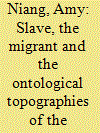

|
|
|
|
|
| Summary/Abstract |
An examination of the figure of the slave and the figure of migrant make visible important historical interconnections that sustain past and present elaborations of the human and ‘the international’. These interconnections have always been racialised and they have structurally constituted the making of an interdependent world community. A series of instrumentalised discourses, at times turned into rationalities that govern policies towards migrants, particularly in a post 9/11 context, increasingly normalises the idea that there are people that can be justifiably expelled from the civic/civil, and increasingly human sphere. The slave was forcefully removed, both physically from attachment to kin and land, and morally from the history of humankind. The migrant is pushed out of the bounds of the livable as well as the moral category of rights-bearer. The commonalities that configure both phenomena are rooted in an extractive supply economy and a hierarchised ordering of humans. The article uses the history of Frederick Douglas to show that the absence of ‘care’ as methodology of relationality limits the valence of interdependence as a marker of a globalised world. In doing so, it challenges the unexamined assumptions of new/posthumanism that advocates radical interdependence without interrogating the modalities of ‘humanity’ among different categories of humans.
|
|
|
|
|
|
|
|
|
|
|
|
|
|
|
|
| 9 |
ID:
175166
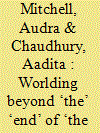

|
|
|
|
|
| Summary/Abstract |
We often hear that the ‘end of the world’ is approaching – but whose world, exactly, is expected to end? Over the last several decades, a popular and influential literature has emerged, in International Relations (IR), social sciences, and in popular culture, on subjects such as ‘human extinction’, ‘global catastrophic risks’, and eco-apocalypse. Written by scientists, political scientists, and journalists for wide public audiences,1 this genre diagnoses what it considers the most serious global threats and offers strategies to protect the future of ‘humanity’. This article will critically engage this genre to two ends: first, we aim to show that the present apocalyptic narratives embed a series of problematic assumptions which reveal that they are motivated not by a general concern with futures but rather with the task of securing white futures. Second, we seek to highlight how visions drawn from Black, Indigenous and People of Color (BIPOC) futurisms reimagine more just and vibrant futures.
|
|
|
|
|
|
|
|
|
|
|
|
|
|
|
|
|
|
|
|
|